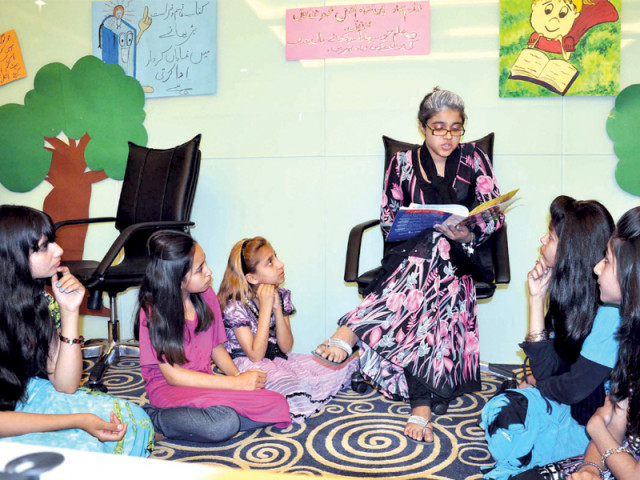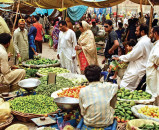National Book Day celebrations: A treasure trove for curious minds
Readers rejoice in stocking up on old and new favourites.

Colourful banners streaming down the walls, vertical posters of the country’s literati and a courtyard of books set the stage for the second day of the National Book Day celebrations.
Though most stall owners and representatives of organisations were satisfied with the way the festival had been organised by the National Book Foundation (NBF), others were visibly disappointed at the arrangements at the Pak-China Friendship Centre.
“We do it because of our passion,” remarked Funkor Child Art Centre Director Fauzia Minallah. She was disappointed that more than half of the auditorium remained empty during her presentation.
Her illustrative character Amai, the bird of light, spreads the message of peace and hope among young children across classes, cultures and religions. “It is children that bring life to my books by asking questions and unravelling messages hidden in the stories,” she said.
Nigar Nazar — the first female cartoonist, creator of Gogi and author of 11 illustrated books — shared in the sense of disenchantment with the poor support extended to writers and artists. “The National Book Foundation did not even cover our basic costs,” she said frowning.
Speaking on the Rs50 million donation pledged by Prime Minister Yousaf Raza Gilani to NBF, she argued the sum should trickle down to those who truly deserve it, adding that “support should come from the powers that be.”
The tremendous response from children, “which is who we’re doing this for,” more than made up for the management’s ambivalence. Nazar added that with the right funding and support, she could “make reading a fantasy for kids.” A more immediate concern was the digital revolution that seems to be swallowing books whole; facing increased competition from digital platforms, Nazar fears the very idea of “digital” interferes with the reading experience so unique to each individual.
The inclusive nature of the festival especially benefitted schoolchildren of public schools who don’t usually have access to the books on display. The extracurricular activities, too gave children a chance to look at literature with a fresh pair of eyes.
During an arts and crafts session, a joint collaborative effort between Oxford University Press (OUP) and Idara Taleemo-Agai (ITA), schoolchildren from Pehli Kiran and the Child Domestic Labour Centre sat around a conference table to paint messages of peace and book reading on handkerchiefs. Saadia Zeeshan of ITA worried that the programme did not afford the appropriate amount of time to foster love for literature.
The large assortment of books displayed by various publishers including giants like OUP and Paramount Publishing Enterprise, offered many a quality read at throwaway prices.
Tayyeb Azhar Shah, a fourth grade student from Islamabad Convent School, as a true bookworm, felt like “a kid in a candy store.” The bespectacled Azhar with his pert tie and crisp white uniform spoke eloquently about balancing his love for books and computer games, a veritable Harry Potter in a different world.
Reading habits are changing. Books have to compete with an ever increasing number of gadgets and gizmos, but festivals like these may give the fast fading culture of good ol’ fashioned book reading a fighting chance.
Published in The Express Tribune, April 25th, 2012.



















COMMENTS
Comments are moderated and generally will be posted if they are on-topic and not abusive.
For more information, please see our Comments FAQ